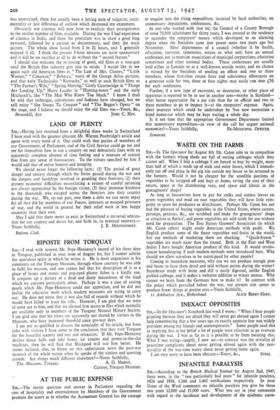WASTE ON THE FARMS
Snt,—In The Spectator for August 8th Mr. Caton asks us to sympathise with the farmers whose sheds are full of totting cabbages which they cannot sell. When I buy a cabbage I am forced to buy by weight, more than half of which is made up of stalk and outer leaves, which I immedi- ately cut off and place in the pig bin outside my house to be returned to the farmers. Would it not be cheaper for the unedible portions of vegetables to be stripped off and kept at home, saving the cost of their return, space in the distributing vans, and space and labour in the greengrocers' shops?
As long as housewives have to pay for stalks and useless leaves on green vegetables and mud on root vegetables they will have little sym- pathy to spare for producers or distributors. Perhaps Mr. Caton has not had the pleasure of buying vegetables in the United States, where carrots, parsnips, potatoes, &c., are scrubbed and make the greengrocers' shops as attractive as florists', and green vegetables are sold ready for use without need for preparation. The East Sussex Growers' Association (to which Mr. Caton refers) might study American methods with profit. We English produce some of the finest vegetables and fruits in the world, but our methods of marketing them are shocking. " Quick-frozen" vegetables are much nicer than the tinned. Both in the East and West Indies I have bought American produce of this kind. It would revolu- tionise housekeeping if such modern methods were introduced here. Why should we allow ourselves to be outstripped by other people?
Coming to immediate measures, why can we not produce enough peas and beans to have them dried and sold without points during the winter? Sauerkraut made with brine and dill is easily digested, unlike English pickled cabbage, and it makes a welcome addition to winter menus. Why cannot we learn from the Germans how to make it? In contrast with the policy which prevailed before the war, our present aim seems to produce fewer things at greater cost.—Yours faithfully,


































 Previous page
Previous page